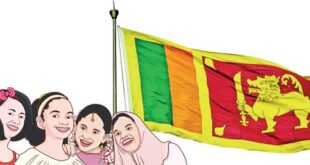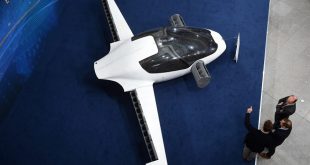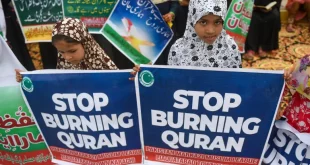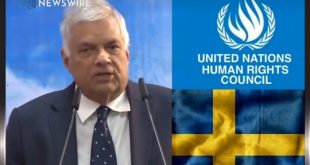An inquiring Journalist shares his thoughts after a nearly three-week sojourn in the United States, telling us what America is and what it is not, and that looking at it in black or white is certainly not the answer to our problems. Asiff Hussein, though a layman, was fortunate to be part of a group of Sri Lankan religious scholars of all major faiths visiting the US on a Programme on Religion and Social Justice in America organized by the State Department from June 28 to July 16, 2010. He shares with us the rich experiences of his brief but eventful visit and his many thoughts arising from it, especially in relation to the Muslim world. Let’s hear what he has to say.

Let me confess I am no lover of America and probably never will be. But this was not always so. Growing up in an English-speaking environment with Hollywood movies, Marvel comics and Pop music besides other aspects of American culture in our early childhood made us look upon America with awe and wonderment – the place to be in. I can still picture in my mind’s eye avidly going through my favourite comic strip Tintin in America which tells of Tintin the Journalist’s adventures in America. Little doubt it influenced my choosing journalism as a career later in life. But one’s childhood, however memorable it may be, is no yardstick to look at the real world for it is a time when we are enchanted with all things material and the small world around us with others doing the thinking for us.
And so things changed as I grew up. I would come to realize that things were not really as it seemed. In my later childhood for instance my conscience often pricked me when I heard of the unspeakable sufferings caused to the Japanese people by the atomic bombing of Hiroshima and Nagasaki with generations suffering the consequences of the fallout. Growing up into adulthood I was often disturbed by the stories of the Vietnam War and the harmful effects of Agent Orange that were being told to the world at the time.
And I was distressed when George Bush Senior launched the first Gulf War to oust Saddam Hussein from Kuwait. I wondered to myself what the big deal was when Israel had not only taken over Arab lands after the six-day war of 1967, but continued to illegally occupy it and even build Jewish settlements displacing thousands of innocent Palestinians in the process. At least Saddam had not gone so far, and reprehensible as his action was, it was an eye-opener to set things right in the Middle East. But worse was to come when I read of the horrific accounts of the effects of the depleted uranium the US military had dropped in Iraq as part of its campaign to weaken Saddam, a campaign that had a terrible impact on ordinary Iraqis including those thousands of innocent children who would die a slow and lingering death from the childhood cancers the uranium caused. I still recall seeing in a Frontline magazine of the time, a picture of a sick little Iraqi child, her little body broken down by a lack of medication, needlessly dying because the US had compelled the UN to impose sanctions on the Iraqi people. This image like many others would continue to haunt me in the days and years to come and now that I am the father of two little daughters, they are all the more painful to recall.
And I was outraged when George Bush Junior finally invaded Iraq to oust Saddam on the trumped up charges that Iraq possessed Weapons of Mass Destruction. And even if it had them, so what ? Israel too had them and the US nor any of its allies ever made an issue of it. Nay there was more to it. One was of course to safeguard Israel from the threat of an Iraqi attack. The other was as the German newspaper Der Spiegel put it bluntly Blut fur ol (Blood for Oil). It was all the more distressing because it was such an uneven war, a mighty military power going to war with the full array of its arsenal against a small developing Middle Eastern state. Here was technological arrogance at its height with terrible multi-tonne bombs like Daisy Cutters doing the talking.
And I was infuriated when working as a Journalist for a leading state-controlled English language Sunday newspaper I noticed some rather strange editorials in the period leading up to the build up of the war against Iraq, in support of US foreign policy even to the extent of justifying the nuking of Hiroshima and Nagasaki. One bizarre passage from the paper dated 9 February 2003 had it that “When the United States dropped atom bombs on Japanese cities in the ferocious closing stages of the Second World War, it had the moral support of countries and societies that upheld the strongest systems of modern democracy”. Another read: “The US today, in keeping with its commitment to global peace and democracy is once again engaged in intensive international consultations in attempting to restrain a state, Iraq”. This was all the more surprising as my Editor was a man whom I greatly admired for his forthright and humanistic views. I decided not to have much to do with him and one day while I am browsing through the newspapers, the man, probably sensing my disappointment at the recent editorials he had been turning out, candidly admitted that he had no hand in it and that the editorials concerned did not at all reflect his thinking, and that he had been compelled by the powers that be to carry the comments which were faxed to him by the US embassy in Sri Lanka. Of course this happened during the term of a different Sri Lankan government than that existing now and a different US administration than that which exists today. It is unthinkable that such a thing could happen in our day.
Thus it would be evident from the foregoing that my esteem for the US had suffered over the years since my halcyon childhood days. Of late however I must admit that my views of America had mellowed a bit with the victory of president Barack Obama whose middle name happens to be the very Muslim sounding Hussein, not to mention his Muslim antecedents and his longstanding opposition to the Iraq War, showing that those young Americans who chose him certainly knew better than their elders with their cold war mentality and that they yearned for change for the better which was something the rest of the world could look at in a positive light. The fact that of late Obama had gone so far as to snub Netanyahu seemed to suggest that the unthinkable had happened and that there was perhaps still room for change in America. However as subsequent events proved, change does not come easy. And now Uncle Sam had thought it fit to invite me to his hallowed land. And believe me I actually accepted his invitation, something that would have been unthinkable a few years back. Here was my chance to understand America and its people first hand. As a Journalist I needed a fresh experience to write about; and as a human I needed to understand Americans better, more so since the most basic teaching of the discipline I had chosen to pursue for my higher studies, Sociology, was to ‘understand the other’. But why the other ? one might ask. The fact, sad to say, is that by now America had sort of become ‘the other’. But such is the world we live in with artificial barriers of all sorts impeding our understanding of one another. Understanding the other is then the first step in coming to terms with the complex world we live in. Understanding the other, despite our differences is what really makes us human. To think otherwise would only make us less.
 Sri lanka Muslims Web Portal Diversity and Inclusiveness
Sri lanka Muslims Web Portal Diversity and Inclusiveness



